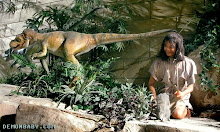This is the article that was published in Nature last week. I should of posted the letter in its entirety at first, I forget that I get free access to these things because I am a graduate student.
We were perplexed by your Editorial on the work of the Templeton Foundation ('Templeton's legacy' Nature 454, 253-254; 2008). Surely science is about finding material explanations of the world -- explanations that can inspire those spooky feelings of awe, wonder and reverence in the hyper-evolved human brain.
Religion, on the other hand, is about humans thinking that awe, wonder and reverence are the clue to understanding a God-built Universe. (The same is true of religion's poor cousin, 'spirituality', which you slip into your Editorial rather as a creationist uses 'intelligent design'.) There is a fundamental conflict here, one that can never be reconciled until all religions cease making claims about the nature of reality.
The scientific study of religion is indeed full of big questions that need to be addressed, such as why belief in religion is negatively correlated with an acceptance of evolution. One could consider psychological studies of why humans are superstitious and believe impossible things, and comparative sociological studies of religion using materialist explanations of the rise and fall of the world's belief systems.
Perhaps the Templeton Foundation is thinking of funding such research. The outcome of such work, we predict, will not bring science and religion (or 'spirituality') any closer to one another. You suggest that science may bring about "advances in theological thinking". In reality, the only contribution that science can make to the ideas of religion is atheism.
Matthew Cobb and Jerry Coyne
Wednesday, September 10, 2008
Subscribe to:
Post Comments (Atom)
.jpg)



No comments:
Post a Comment